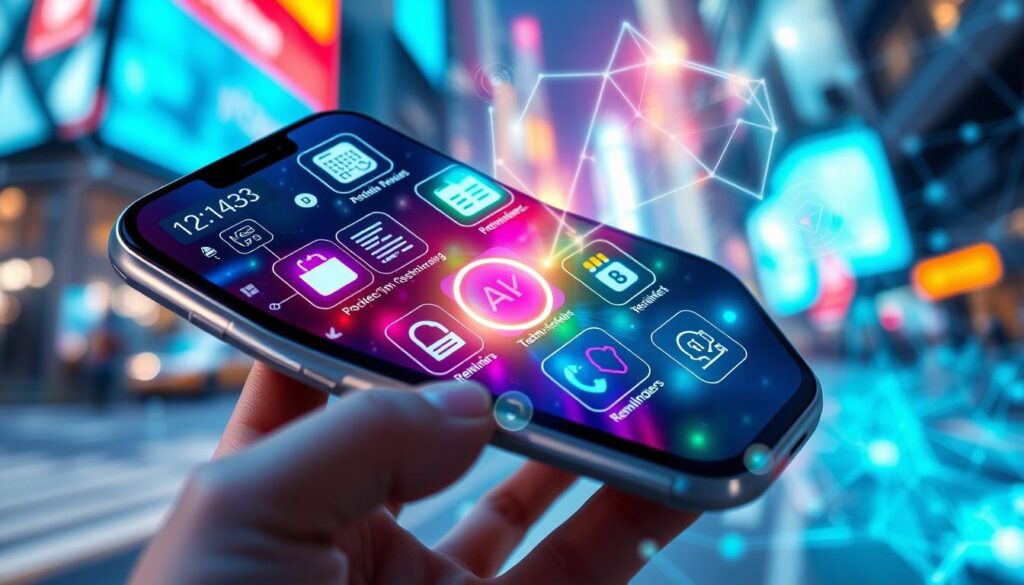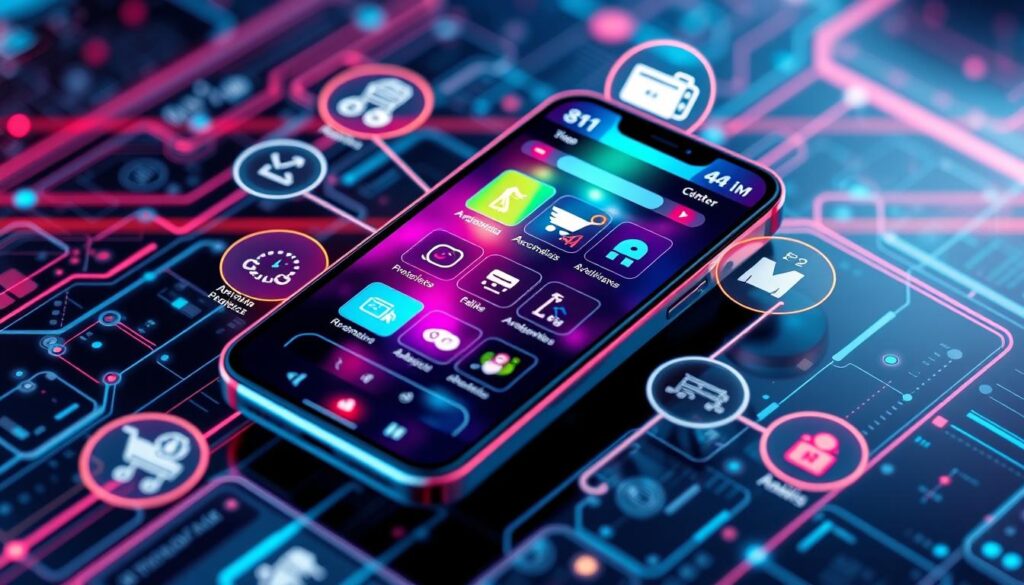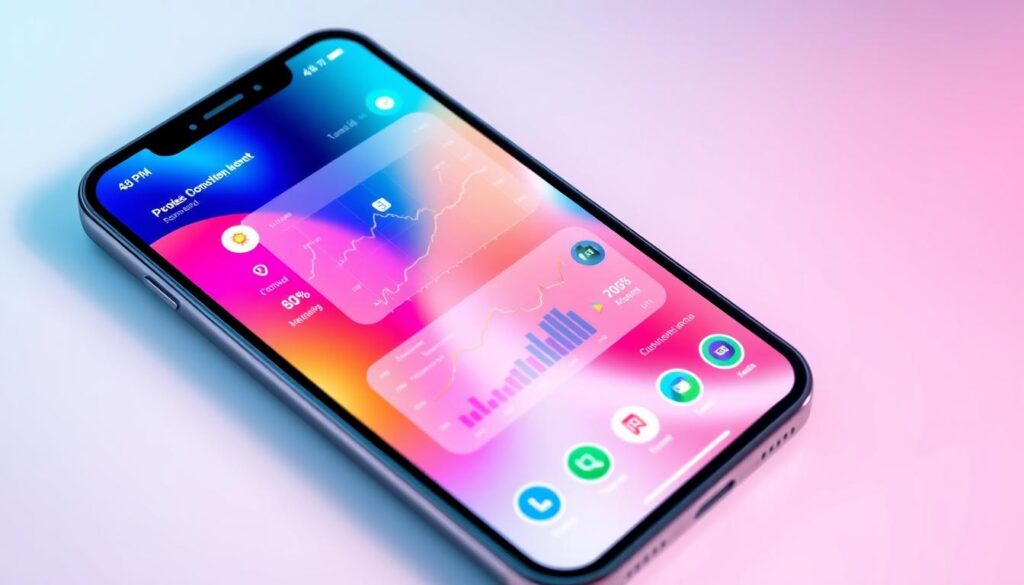Looking back, AI has changed our daily lives a lot. The mobile AI market was worth USD 13.40 billion in 2022. It’s expected to grow by 26.9% each year until 2030. This growth comes from people wanting AI apps that are personal, efficient, and secure.
As someone who knows a lot about this, I’ve seen how AI apps change how we use our phones. They make our devices easier to use and more fun.
AI in app development has made apps smarter and more tailored to what we need. AI apps, like those that learn from us, keep users coming back by up to 50%. By 2024, more than 80% of apps will use AI, showing how big of a deal it is.
Key Takeaways
- The global mobile artificial intelligence market is projected to experience a CAGR of 26.9% from 2023 to 2030.
- AI mobile apps can provide personalized experiences, improve efficiency, and enhance security.
- 70% of mobile app developers report that integrating AI into their applications has significantly improved user engagement.
- Personalized mobile applications can increase user retention rates by up to 50%.
- By 2024, it is estimated that over 80% of mobile applications will utilize some form of artificial intelligence.
- AI-powered chatbots can handle up to 80% of routine customer queries, leading to a 40% reduction in operational costs for businesses.
- 75% of users are more likely to download apps that offer enhanced functionalities through AI, such as predictive text and automated task management.
What is an AI Mobile App?
Exploring AI mobile apps is really interesting. These apps use AI technology and machine learning algorithms for tasks like image recognition and natural language processing. They have mobile processors, sensors, machine learning frameworks, and data processing. All these work together to bring AI features to life.
The mix of AI technology and mobile app programming has led to cool apps. For example, Siri and Google Assistant can do lots of things. They answer questions and give info on many topics. Machine learning app development also makes apps more personal and efficient.
AI mobile apps include face editing, voice assistance, and language learning apps. They make our experience better and more fun. As the AI software market grows, we’ll see even more cool AI apps. They’ll use AI technology and mobile app programming to offer personalized and efficient solutions.
Benefits of AI Mobile Apps
Exploring AI mobile apps reveals many benefits. Thanks to AI app developers, apps are now easier to use. They offer a smooth experience by analyzing how we use them and suggesting what we might like next.
AI chatbots help with questions, and virtual assistants manage our schedules. This makes our daily tasks easier and saves time. In fact, more companies are using AI, and the market is expected to reach $126 billion in five years.
Improved User Experience
AI apps make our interactions more personal. They use data to guess what we might want next. This makes us happier and more engaged with our devices.
Increased Efficiency
AI apps automate tasks, saving us time and effort. They help businesses by suggesting products we might like. They also understand our feelings about products, helping companies make better choices.
Personalized Recommendations
AI apps give us recommendations that fit our tastes. This makes them more enjoyable to use. As AI in mobile apps grows, so does their impact on how we use our devices.
Popular AI Mobile Apps to Explore
Exploring AI mobile apps, I find many options with special features. AI has changed how we use our devices, offering personal help, fun, and health checks. Mobile AI apps make our experience smooth and easy.
Apps like Siri, Google Assistant, Replika, and Sleep Cycle are popular. They use AI to help with reminders, sleep tracking, and more. For example, Replika lets you create a digital friend, and Sleep Cycle tracks your sleep to help you sleep better.
More people want apps that understand them and are easy to use. As the app market grows, we’ll see more AI apps changing our lives. AI’s future looks bright, and I’m eager to see what’s next.
- Siri: virtual assistant with personalized recommendations
- Google Assistant: compatible with a broad range of smart devices
- Replika: AI companion app with personalized digital companions
- Sleep Cycle: smart sleep analyzer with sleep pattern tracking
In conclusion, AI mobile apps are changing fast, with new apps every day. As we dive deeper into AI, we’ll see even more exciting apps in the future.
How AI Mobile Apps Improve Productivity
Exploring AI mobile apps, I see their huge potential to change how we work. They use artificial intelligence to do routine tasks, give us tailored advice, and help us in real-time. For example, AI apps for managing projects help teams work together and keep track of their progress. Virtual assistants powered by AI can handle our schedules and remind us of important things.
AI has made mobile apps better at managing tasks. These apps sort tasks, track how we’re doing, and offer tips for getting better. Smart scheduling tools help us plan our time, set reminders, and get alerts. Some top AI apps for boosting productivity include:
- Trello and Asana, which use AI to sort tasks and track progress
- Google Calendar, which helps plan our schedules and reminds us
- AI-powered virtual assistants like Siri and Google Assistant, which manage our schedules and offer help on the go
Using AI apps in our daily lives can really up our productivity game. They automate boring tasks and give us advice tailored just for us. As mobile app development keeps getting better, we’ll see even more cool AI apps that change how we work and live.

In short, AI mobile apps can greatly improve our productivity. They offer tools for managing tasks, scheduling, and personalized advice. As we keep exploring AI in mobile apps, we’ll see even more ways to work smarter and more efficiently.
| AI Mobile App | Productivity Feature |
|---|---|
| Trello | Task management and prioritization |
| Google Calendar | Smart scheduling and reminders |
| Siri | Virtual assistance and real-time scheduling |
The Role of Machine Learning in Mobile Apps
Machine learning is a key part of AI mobile apps. It lets them learn from how users act and change to meet their needs better. AI app developers use machine learning to make apps better over time. This makes the app more useful for the user.
Machine learning helps apps adapt quickly to what users want. This means apps can change fast to meet new needs and preferences.
Machine learning in mobile apps brings many benefits. It includes predictive analysis, voice recognition technology, and anomaly detection. These features make apps more engaging and secure. They also help catch fraud, making the app safer for users.
Some interesting stats show how machine learning helps mobile apps:
- Up to 30% of mobile app users like apps with machine learning security.
- Machine learning can make apps faster, with some seeing a 50% speed boost.
- AI and ML in apps make them more user-friendly and efficient.
In summary, machine learning is very important for mobile apps. It helps them offer better experiences and adapt to user needs. As more apps use AI, machine learning will be even more crucial in the future.
| Feature | Benefit |
|---|---|
| Predictive Analysis | Enhanced user engagement and retention rates |
| Voice Recognition Technology | Improved accessibility and user satisfaction |
| Anomaly Detection | Increased security and fraud detection |
Security Features in AI Mobile Apps
AI technology is getting better, and mobile app design must focus on security. This is to keep user data safe. AI apps can have better security, like encryption and safe login systems. For example, AI can use biometrics for extra security, and it can spot and stop fraud.
Some important security features in AI mobile apps are:
- Enhanced data protection through encryption and secure authentication
- Fraud detection mechanisms, such as machine learning-based anomaly detection
- Real-time monitoring to detect and respond to threats
The global market for AI in cybersecurity is expected to hit $102.78 billion by 2032. This shows we need more AI security solutions. By using AI in mobile app design, developers can make apps that are safer and more reliable. These apps will protect user data and stop fraud.
How AI Mobile Apps Transform Health Monitoring
AI mobile apps are changing health monitoring in big ways. They offer personalized advice, real-time help, and emotional support. For example, AI mobile app technology helps create new health monitoring tools. These tools can spot early signs of chronic diseases, helping patients get better faster.
AI in mobile apps has led to advanced health monitoring systems. These systems can look at lots of user data, giving insights to doctors. AI-powered fitness trackers track activity, sleep, and suggest ways to get better. Mental health apps also offer support and strategies for those dealing with mental health issues.
Some important stats show AI’s impact on health monitoring:
- The global market for mobile health apps is expected to hit about $311 billion by 2027, growing at a CAGR of around 44.2%.
- AI health apps can make patients more engaged by 30% to 50%.
- AI can help catch diseases early, cutting hospital admissions by up to 20%.
As more people want AI health solutions, keeping data safe is key. We must make sure these apps are built with care and honesty. By using AI, we can make healthcare more personal, efficient, and effective, saving lives.
AI in E-commerce Mobile Apps
Exploring e-commerce, I see how AI changes the game for mobile apps. AI brings personalized shopping and better customer support through chatbots. With the e-commerce market set to hit $4,117.00 billion in 2024, using AI apps is key to staying ahead.
AI helps businesses understand what customers want and predict sales. This info leads to better marketing and happier customers. For example, Sephora’s AI app has gotten over 2 million downloads and 8.5 million visits, showing AI’s power in e-commerce.
Benefits of AI in e-commerce apps include:
- Personalized product suggestions
- Improved customer service with chatbots
- Accurate sales predictions
- Efficient inventory management
These advantages come from smart AI use, boosting customer loyalty and sales.

Future Trends in AI Mobile App Development
Looking ahead, AI mobile app development is moving towards integrating with IoT devices and growing voice-activated services. The need for smarter apps is driving the use of AI-powered algorithms. These algorithms analyze user behavior to offer personalized suggestions.
Statistics show that 17.9% of people use voice for shopping at least once a week. This number jumps to 30.4% for Generation Z. The global market for multimodal UI is set to grow at a 16.5% CAGR from 2024 to 2032. This highlights a big trend towards voice-activated services.
Some key trends in AI mobile app development include:
- Integration with IoT devices, enabling seamless interactions between devices
- Growth of voice-activated services, providing hands-free control and convenience
- Increased use of machine learning algorithms, enabling apps to learn from user behavior and adapt to changing preferences
By 2025, AI apps on iOS and Android will automate complex tasks and suggest based on user behavior. The number of connected IoT devices worldwide is expected to hit 75.44 billion by 2025. This shows the growing need for AI in mobile app development.
| Trend | Description |
|---|---|
| Integration with IoT devices | Enabling seamless interactions between devices |
| Growth of voice-activated services | Providing hands-free control and convenience |
| Increased use of machine learning algorithms | Enabling apps to learn from user behavior and adapt to changing preferences |
Tips for Choosing the Right AI Mobile App
Choosing the right AI mobile app can be tough. It’s important to know what you need and what the app offers. For example, if you want an app that makes your daily life easier, look for one that learns your habits.
Reading user reviews is key when picking an AI app. You can find these on app stores like Apple App Store or Google Play. They give you a good idea of what the app can do and what it might not.
- Features and functionality
- User reviews and ratings
- AI app integration and adaptability
- Mobile app design and user experience
By looking at these points, you can find an AI app that works well for you. It should make your life easier and be easy to use.
Conclusion: Embracing AI for a Smarter Mobile Experience
AI technology is growing fast, opening up new chances for mobile app development. AI-powered mobile apps will change how we use our devices. They will make our experiences better, more productive, and tailored to us.
These apps will learn our habits and needs, making our lives easier. They will be safe and work well in many areas. This means better shopping, health tracking, and learning on our phones.
AI is making mobile apps smarter and more personal. It’s changing what we expect from our devices. By using AI, developers can make our phones do more for us, making our lives better.



